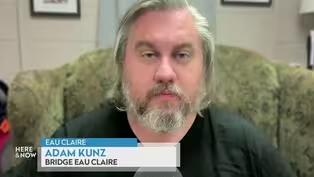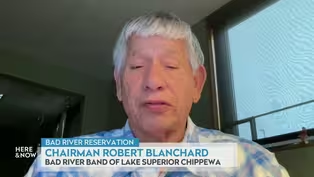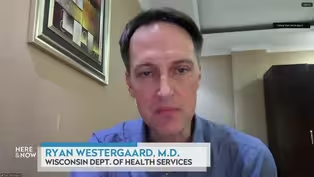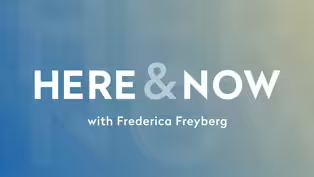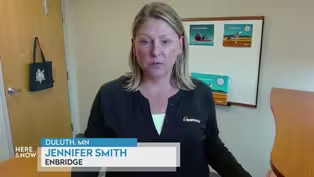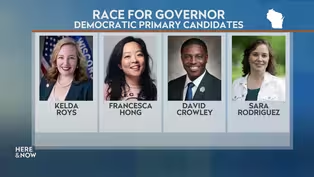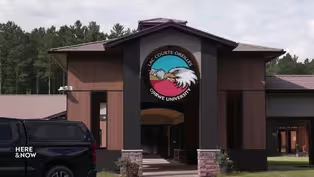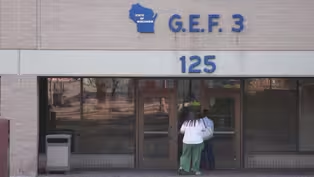Here and Now
Here & Now for September 19, 2025
Season 2400 Episode 2411 | 26m 47sVideo has Closed Captions
Watch the entire episode of Here & Now for September 19.
Watch the entire episode of Here & Now for September 19.
Problems playing video? | Closed Captioning Feedback
Problems playing video? | Closed Captioning Feedback
Here and Now is a local public television program presented by PBS Wisconsin
Here and Now
Here & Now for September 19, 2025
Season 2400 Episode 2411 | 26m 47sVideo has Closed Captions
Watch the entire episode of Here & Now for September 19.
Problems playing video? | Closed Captioning Feedback
How to Watch Here and Now
Here and Now is available to stream on pbs.org and the free PBS App, available on iPhone, Apple TV, Android TV, Android smartphones, Amazon Fire TV, Amazon Fire Tablet, Roku, Samsung Smart TV, and Vizio.
Providing Support for PBS.org
Learn Moreabout PBS online sponsorshipThe following program is a PBS Wisconsin original production.
>> We've issued a statewide standing medical order that allows pharmacists to provide the Covid 19 vaccine to those who want it, without requiring a prescription from a clinical provider.
medical officer issues a prescription for all Wisconsinites to get their Covid vaccine.
[MUSIC] guidance as vaccine hesitation spreads.
[MUSIC] I'm Frederica Freyberg tonight on "Here& Now".
The case for and against an oil pipeline reroute near tribal lands.
Fallout from comments about Charlie Kirk's assassination continue to ricochet.
But college students are still trying to bridge divides.
[MUSIC] And Republican lawmakers want public employees to return to office buildings.
It's "Here& Now" for September 19th.
[MUSIC] >> Funding for Here and Now is provided by the Focus Fund for Journalism and Friends of PBS Wisconsin.
>> Wisconsin health officials want to make sure anyone who wants to get an updated Covid 19 vaccine can.
That's why the state's top epidemiologist has issued a standing medical order after a federal vaccine panel Friday declined to recommend Covid 19 vaccines for all Americans.
The state order coincides with guidance from the Commissioner of Insurance, saying health plans should cover the cost.
>> In the past, our nation's medical associations and our nation's federal health agencies who review the same data have issued recommendations that align with one another.
Today, that's not the case.
In the past several months, leaders at federal agencies have made policy decisions and issued recommendations that aren't supported by or directly contradict scientific consensus.
These decisions might may result in limited access to the Covid 19 vaccine, which scientific studies have continuously showed lower the risk of illness, hospitalization and death for people who choose to get them.
controversy over the oil and gas pipeline through northern Wisconsin went before the public this week during the third of four contested case hearings across the state.
In Ashland, the bad River Band of Lake Superior Chippewa presented witnesses in their challenge of the permits the Wisconsin DNR granted to Canadian Enbridge Energy Inc.
for a 41 mile reroute of the pipeline.
Operational since 1953.
Line five, as it's known, carries 23 million gallons a day from Superior to Ontario.
The tribe had sued to remove the pipeline from its reservation lands after easements expired.
And in 2020, Enbridge proposed rerouting part of the line around tribal lands.
Late last year, the DNR granted permits for pipeline construction that impacts wetlands and waterways, as well as granting permits to maintain erosion control and water quality in the midst of construction.
That includes blasting, bedrock and drilling.
The tribe and environmental groups challenged those permits, resulting in the court ordered public hearings.
Bad River tribal chairman, Robert Blanchard, was the first to take the stand.
And chairman, thanks very much for being here.
>> Thank you for having me.
>> So what did you most want the judge to know about the impacts of line five and its reroute around the bad River reservation, but through nearby wetlands and wetlands, what did you most want the judge to know about those impacts?
>> So reroute is going within the ceded territories of of of the the band.
And impact is going to be over 100 acres of wetlands, which, you know, will get disturbed.
30 some acres of that will not be usable again through horizontal direct drilling, blasting, which is going to, you know, a lot of it's going to impact our our water resources.
>> Now, I know, I know, the tribe wanted the pipeline removed from your land.
Why isn't rerouting it around the reservation proper enough?
>> Well, I will do is shift the risk upstream, exposing more of the environment to be put at at at risk than than what is now.
But, you know, like I said before, we have ceded territories hunting and fishing and gathering of of medicines and other other stuff.
So I mean that that's just going it's just moving the problem upstream.
You know, we're we'll be downstream from that.
And if something were to happen, you know, it's really impact us as people and our way of life.
>> Circling back to something you spoke to a moment ago during your testimony, you spoke about the wild rice harvest.
Why is that?
And hunting and fishing rights you hold.
So key to your community?
>> Well, we've been harvesting wild rice on in the Sokaogon Streu's for over 100 years.
You know, my grandparents brought us harvested down there, and they they made rice camps down there.
And, you know, so that that's near and dear to my heart and a lot of other people also.
But.
It identifies us as, as people, you know, that that we were brought here for a reason.
And, and one of the reasons is that to go where the food grows on the water, and that was the wild rice, and that is quite dear to us.
And as far as other things, hunting, fishing and gathering, you know, there's a lot of people today that that use that resource to provide and put food on the table for their families.
So it's very important to us.
>> Why are the waters and the land so important to the protection of those rights?
>> Well, we also feel that, you know, everything out there is sacred.
You know, we we we we use that that those resources.
And when we go and harvest and we go hunting or fishing, we take only what we need to do for our families.
So and we also believe that, you know, that everything out there has a spirit.
Every living thing out there has a spirit, you know?
And that's what we're protecting is the spirit of that medicine, the spirit of that wild rice and the spirit of those waters and lands to be able for our future generations, to be able to enjoy that.
>> For its part, Enbridge states that they have learned what they do today impacts the next seven generations.
And it has that.
It has a responsibility to care for the land.
What's your response to that statement from the CEO of Enbridge?
>> Well, I don't think Enbridge really understands, you know, the they look at it a lot different than we do.
You know.
They're they're there for for different reasons.
And we're there to to protect the land, truly protect the land and the resources.
>> Your Band River Band is fighting hard over this.
What will you do if the line five project is allowed to proceed in this way?
>> Well, that's a that's the big question.
We are still trying to come up with some some answers, and we're just going to keep moving forward and keep fighting.
>> We will be watching.
Chairman Robert Blanchard, thanks very much.
>> Thank you very much for having me.
>> Next week, Enbridge and the DNR will present their cases in the fourth public hearing on the proposed reroute of line five.
Jennifer Smith is the director of US tribal engagement for Enbridge.
She joins us now.
And thanks very much for being here.
>> Thanks for having me.
>> So, as you know, the legal fight over line five, as it's known, has been ongoing for years.
Why is it worth it to your company to persist?
>> Sure.
So the project that we've proposed is related to our line five pipeline.
Line five is critical for supplying the energy that our Midwest, Great Lakes regions all rely on.
Millions of us every day are using the end products that line five is transporting to ten different refineries.
It's providing natural gas liquids to other companies that will extract the propane and deliver it to the homes throughout the region.
And so we have a responsibility to make sure that we can continue to safely deliver that energy that we're all relying on.
And the project we propose this project almost five years ago, over four years, and initiated the project permits, because this is in response to the Band River Band request that we remove line five from the reservation, which it currently crosses.
>> So your company has an indigenous reconciliation action plan that includes acknowledging and historical lack of inclusion of indigenous people and their well being.
Additionally, the Enbridge CEO states, we have learned that what we do today impacts the next seven generations, and we have a responsibility, he says, to preserve and care for the land.
Learn from her original inhabitants, inhabitants and move forward together in the spirit of healing, reconciliation and responsibilities seriously.
So how does that statement square with the pitched legal fight with the Bad River over line five.
>> In specific to the Indigenous Reconciliation Action Plan?
Our first plan was issued in 2022 that we call it the Irap identified 22 tangible commitments and actions that we can take as a company to try and work with tribal communities.
And since that time, you know, there have been a number of successes to that in terms of, you know, making sure that our tribal contractors, tribal community members are able to work with Enbridge and economically participate in what is it that we do?
I will point out that, you know, it was the band that sued Enbridge back in 2019 regarding line five crossing the reservation.
And so even with, you know, we are full steam ahead on this project, we fully expect to see the permits get reaffirmed.
But at the same time, we we want to work with the Band River Band and tribal community to we'd rather work together.
>> How do you respond to the concerns from those challenging the permit that a pipeline spill could impact the tribal communities very way of life?
That depends on clean water and wetlands for food sources?
>> First of all, I'll say we all depend on clean water as humans, and so we all have a vested interest in safety and environmental protection.
You know, we are operating these pipelines.
There are hundreds of thousands of miles of pipelines across the US that operate every day quietly, safely.
We don't hear about them.
And and so, you know, Enbridge for one, has invested billions of dollars over the years into the integrity of our systems.
We are monitoring these pipelines 365 days a year, 24 hours a day, seven days a week.
We are continuously running tools and doing checks to make sure that we know the integrity of our pipeline.
We know that it's safe.
>> So what happens if this reroute is rejected?
>> The DNR did an environmental impact statement, which was done over four plus years, and it concluded that those impacts will be minimal, temporary and localized, just like with most, if not any, you know, all construction projects.
And so we fully believe that when we get through the contested case process, the permits will be affirmed and we'll be able to start construction, and we're ready to do that as soon as we get all the approvals required.
Enbridge, thanks very much.
>> Thanks for having me.
>> This update to our tribal college report last week, the Department of Education announced a $108 million increase in funding for tribal colleges and universities before the 2025 fiscal year ends this month.
Lac Courte Oreilles Ojibwe University and the College of Menominee Nation will now receive a boost in funding that the administration says is a one time investment.
Tribal institutions are also funded by the Department of Interior, which has proposed cuts to tribal higher education programs Followingconservative influencer Charlie Kirk.
Dozens of people across the country have lost their jobs over social media comments they made in reaction.
In Eau Claire, Republican Congressman Derrick Van Orden threatened to pull federal funding going to the city over comments to council members made online saying they celebrated Kirk's death.
The council members reject that accusation.
Political discourse, especially online and in social media, even before Kirk's assassination, has been beyond toxic.
But how to agree to disagree and talk about it?
BridgeEauClaire is a chapter of bridge USA, which brings college students of different persuasions together to discuss polarizing topics.
U.A.W.
Eau Claire, political science professor Adam Kuntz is the group's faculty advisor.
>> Thanks for having me.
>> So do you suppose that your next session you will be discussing Charlie Kirk?
>> I believe the students actually already have.
They've had their first session, and they have discussed openly about what their views are on the on the event.
And I believe the students are going to have an ongoing probably throughout the year.
>> What kinds of other topics has BridgeEauClaire engaged on?
>> So BridgeEauClaire is basically what I would describe as the anti debate club.
The goal of the club is basically to be a conversation club.
It's less about winning an argument, it's more about trying to discuss and understand one another in terms of our perspectives on politics, culture, religious backgrounds, etcetera.
And so the topics can be far reaching.
It can be anything from is a hot dog a sandwich all the way up to should the United States disassociate from Israel.
So those, those kinds of topics can be rife with lots of different opinions.
And the goal behind any bridge meeting is basically to bring people from all different perspectives into a room, feel empowered to be able to share your opinions and to try to understand one another.
The goal is not to convince.
The goal is not to win.
The goal is to basically try to get students listening to one another, understanding in a very sincere and genuine way, and then going away and kind of processing that for your own beliefs.
>> So what are the ground rules?
What are the mechanics of these discussions?
How do you start.
>> Yeah, so that's been a learning experience.
This took off a couple years ago when we decided after an event that was run by the center for Constitutional Studies, which is what I'm affiliated with on campus, that we wanted to found a club like this.
This is less about free speech, which is certainly a right that every American citizen has.
This is more about how do I exercise my free speech and responsible ways, and to allow other people to express those free speech rights.
And so the ground rules are very much, first of all, guided by the national organization.
It's there's there's a whole handbook that the students go through to kind of figure out how they would bring up a topic.
There's moderating time.
There is a club president, there are people that are in charge for picking the topics themselves.
But then within the local organizations, there's a lot of adaptability and Eau Claire students are very polite students.
They've got, you know, Wisconsin nice.
And so I think that they they add this extra layer of kind of wanting to build a community despite political to admire the Gen Z students because I think they are looking for ways to build that kind of social connection in a world that's mostly driven by algorithms.
have you found students to engage in actual civil discussion with this generation, possibly craving real connections?
>> Yeah, I think so.
I've I've watched I've been teaching for about ten years in different capacities, and I've watched as the Gen Z population has started to mature.
And it's interesting.
We're about three years away from having our first gen Alpha student in college, which makes me feel so old.
But the Gen Z students are absolutely looking for ways to connect.
But there's this feeling among them that they don't really know how to connect.
There's this kind of catch 22.
They want a social situation.
They want to find a community, but they're so used to being targeted or trolled online, they're scared to be able to express their opinions.
And so clubs like bridge are a great way for them to learn.
You know, those social skills in a real way, and to do so in a closed environment where they going to get piled on or misunderstood, or have something screenshotted and taken out of context.
>> Circling back to Charlie Kirk in the aftermath of his assassination, do you sense a chilling effect on freedom of expression with people across the country right now?
>> I think that there is a huge divide right now over the terms of free speech.
I think that for many Americans, if you ask them on Pew Research questions, for instance, it's it's over a 90% threshold that Americans cherish the value of free speech.
I think the challenge that we always have, though, is what does that mean when it's the other person expressing it?
Everybody wants free speech for themselves.
Query as to to allow free speech for others.
There are, of course, categories of speech that are not protected.
We know what those are incitement, obscenity, etc.
but for the most part, our First Amendment protects us.
It gives us the chance to be able to express ourselves, and especially on university campuses.
That means both Republican as well as Democratic students.
And so I think that universities have a real opportunity right now to show that, you know, in a pluralist society where people come with multiple beliefs, the university can be a place where people express themselves and do so in ways that are not going to be silencing to them, to them.
I wish that we could replicate that in the rest of the public sphere.
I wish that we could help other Americans after college or in other areas of life, recognize that that is really the lifeblood of what we're doing in our American democracy.
>> Indeed.
Professor Adam, thanks very much.
>> Thank you for having me.
>> The list of candidates to be the next governor continues to grow.
Since Democrat Tony Evers announced he would not seek a third term this week, two more Democratic challengers entered their names into the primary race for governor.
State Senator Kelda Roys and State Representative Francesca Hong joined Milwaukee County Executive David Crowley and Lieutenant Governor Sarah Rodriguez in other state government news.
A political debate is brewing at the Capitol over whether state employees remotely or be required to return to the office.
Here and now reporter Steven Potter has details.
>> We want to get the most out of our state workforce, and this should have been done a long time ago.
>> State Representative Amanda Nedweski is pushing for big changes to how, or more importantly, where state employees work.
>> The Return to Work bill simply requires state employees who worked inside an office building for the state prior to March 1st of 2020 to come back and work in person.
from Pleasant Prairie has several reasons why she thinks state employees should be working in state office buildings instead of at home.
>> It's been five years since this temporary solution to the Covid response was instituted.
to evaluate productivity outside of the office.
So it just sort of was we're all going to go home and work remotely, and no one ever has to come back.
It's become sort of a permanent solution to what was a temporary problem.
Assembly debated and ultimately passed Nedweski bill, with all Republicans voting for it and all Democrats voting against it.
>> As amended.
It requires most state employees to be in the office at least 80% of the work month, roughly four days a week, allowing for some flexibility.
>> Nedweski says she wrote the Return to Work bill to rein in a state government remote work system that lacks proper oversight of its employees.
>> People are very concerned about efficiency, fiscal management or mismanagement and fraud.
And I'm you know, this is an accountability issue.
>> And she says her constituents are asking for this bill.
of your taxes.
If you know, if you're a teacher or a nurse, or maybe you're a small business owner, the system.
You want to know you're getting the most you can out of it.
And that's that's what we're hearing from constituents >> Representative Mike Beyer, a Democrat from Verona, says he's hearing very different things from his constituents.
>> And I have not heard from one single constituent, one single state worker who thinks this bill is a good idea.
We heard over and over from from the state government, from secretaries and managers and state government that they don't need this bill.
What they've been doing is working.
effective, which is why it's still in place so many years after the pandemic began.
suggest that this would be helpful to state workers, that this would be helpful to our state government.
No evidence to suggest that this would save any money or make us more efficient.
In fact, it will cost more money and make us more inefficient.
>> To that point of cost, if this bill becomes law, finding office space for state employees to return to would be a challenge.
Over the last few years, many state agencies have realized savings in rent and building maintenance by shrinking or even eliminating their needs for physical office space.
In fact, the state is currently emptying and getting ready to sell three of its largest office buildings in downtown Madison.
bill at the time I introduced it was something like 200 to $400 million to bring employees back because they've closed buildings without evaluating telework performance.
>> Representative Beyer allowed many state employees to move away from the state's larger cities, a benefit they appreciate.
>> They've moved out into the state, across the state, out into assembly districts that aren't as close to Madison as mine is.
So that means that those workers will have to come back, and that has a tremendous cost to it in the hundreds of millions of dollars.
>> Both lawmakers note that cybersecurity issues for remote working state employees is a concern that needs to be addressed.
Beyer and Nedweski also agree that ending or limiting remote work for state employees will have a significant effect on hiring and retention.
>> There would be a bleed of good, talented, skilled people from state want to see.
>> Well, I expect there'd be some turnover.
>> In all.
There are about 70,000 employees working for various state agencies and the universities of Wisconsin system.
Estimates range that from 19 to 75% of those employees work remotely or have hybrid work schedules, depending on the agency.
Representative Nedweski mandate that all state employees can work remotely.
Again.
you have to come back, reevaluate, and if you it's determined by your business unit or by your department that you've been working work situation, you can reengage in a remote work agreement.
however, says offering public employees remote or hybrid work options keeps the state competitive in the job market.
>> I don't think that this is special treatment.
I think this is treatment that's consistent with what the private market is doing.
And and I think that managers have been holding them accountable for being who are working for the taxpayers as they're expected to do.
>> While the Republican majority in the Assembly passed the bill last week, it must still go to the Senate.
And if approved by the Republican majority there, it will go to the desk of Democratic Governor Tony Evers, who will almost certainly veto it.
Reporting from the Capitol.
I'm Steven Potter for "Here& Now".
>> For more on this and other issues facing website at PBS Wisconsin.
Org and then click on the news tab.
That's our program for tonight I'm Frederica Freyberg.
Have a good weekend.
>> Funding for "Here& Now" is provided by the Focus is provided by the Focus Fund for Journalism and Friends of PBS Wisconsin.
Adam Kunz on College Students and Civil Political Discussion
Video has Closed Captions
Clip: S2400 Ep2411 | 6m 23s | Adam Kunz on efforts to bring together college students to discuss polarizing issues. (6m 23s)
Chairman Robert Blanchard on Challenging Line 5 Rerouting
Video has Closed Captions
Clip: S2400 Ep2411 | 6m 2s | Robert Blanchard on challenges to permits for a reroute of the Enbridge Line 5 pipeline. (6m 2s)
Evers Order Requires COVID Vaccine Coverage in Wisconsin
Video has Closed Captions
Clip: S2400 Ep2411 | 1m 7s | Ryan Westergaard on an order requiring insurance to cover access to COVID-19 vaccine. (1m 7s)
Here & Now opening for September 19, 2025
Video has Closed Captions
Clip: S2400 Ep2411 | 1m 13s | The introduction to the September 19, 2025 episode of Here & Now. (1m 13s)
Jennifer Smith on Enbridge's Proposal For Rerouting Line 5
Video has Closed Captions
Clip: S2400 Ep2411 | 4m 55s | Jennifer Smith on Enbridge's plans to reroute its Line 5 pipeline around tribal lands. (4m 55s)
More Democrats Enter Wisconsin's 2026 Gubernatorial Primary
Video has Closed Captions
Clip: S2400 Ep2411 | 26s | State Sen. Kelda Roys and state Rep. Francesca Hong enter the 2026 governor's race. (26s)
Tribal Colleges To Get One-Time $108 Million Federal Boost
Video has Closed Captions
Clip: S2400 Ep2411 | 38s | The Department of Education announced tribal colleges will get a one-time funding boost. (38s)
The Politics of Remote Work and Wisconsin State Employees
Video has Closed Captions
Clip: S2400 Ep2411 | 5m 15s | A bill seeks to halt most remote work practices for state employees in Wisconsin. (5m 15s)
Providing Support for PBS.org
Learn Moreabout PBS online sponsorship
- News and Public Affairs

Top journalists deliver compelling original analysis of the hour's headlines.

- News and Public Affairs

FRONTLINE is investigative journalism that questions, explains and changes our world.












Support for PBS provided by:
Here and Now is a local public television program presented by PBS Wisconsin
